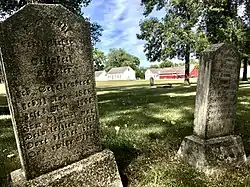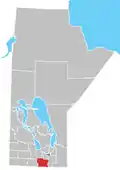Neubergthal
Neubergthal is unincorporated rural community and a National Historic Site of Canada in the Municipality of Rhineland, Manitoba, Canada.[1] Neubergthal was founded in 1876 as a Mennonite community with settlers who came from the Bergthal Colony in Russia. The historic site encompassed six sections of land and the village was laid out in traditional long narrow farmsteads. The village is famous for its traditional Mennonite housebarns and other historic buildings.
Neubergthal | |
|---|---|
Unincorporated rural community | |
 Cemetery and housebarns in Neubergthal | |
 Neubergthal Location of Neubergthal in Manitoba | |
| Coordinates: 49°04′29″N 97°28′52″W | |
| Country | |
| Province | |
| Region | Pembina Valley |
| Census Division | No. 3 |
| Rural Municipality | Municipality of Rhineland |
| Established | 1876 |
| Official name | Neubergthal Street Village |
| Designated | 1989 |
History
Heavy persecution in The Netherlands in the 16th century forced Mennonites to flee for the Vistula Delta and Danzig areas of Prussia, where they were welcomed and allowed to follow the tenets of their faith. Here they developed an ethnic identity. Eventually Plautdietsch became the everyday working language, and High German replaced Dutch in the churches. The swampy marshes were turned into fertile farmland, and flourishing communities evolved. Housebarns were built in Strassendoerfer (street villages). Schools, churches, homes for the aged, Waisenamt (care of widows and orphans), and Brandordnung (fire insurance) were organized.
By 1786, after 200 years of prosperity, land was getting scarce and the Mennonites were denied the right to purchase any new land. Responding to the invitation of Catherine the Great, many families moved to resettle on the vast steppes of southern Russia, having received the assurance that they would receive free land and exemption from military service.
Within a few years there were 400 families living in 18 villages in the Chortitza Colony. When land became scarce again in 1836, a new colony ‘Bergthal’ was established. This is the colony where most ancestors came from. In the early 1870s school reforms, landlessness, and the threat of military conscription led the Mennonites to respond to the Canadian government's invitation to settle in the new province of Manitoba. In 1874 the first of many families landed at the Rat River and stayed in the Shantz shelters near Niverville, Manitoba until village sites had been selected in the East Reserve.
The first settlers moved from villages east of the Red River to the west, looking for fertile farmland. This area was known at the West Reserve. Migration to the new village of Neubergthal was based on family relations, which can be seen in the surnames and marriage patterns of the first inhabitants.[2][3]
Historic Status
In addition to its status as a National Historic Site of Canada, Neubergthal is home to multiple municipal historic sites. These include the Herdsman's House,[4] H.F. Hamm House,[5] and Friesen Interpretive Centre.[6]
The H.F. Hamm House and Friesen Interpretive Centre are maintained by the Neubergthal Heritage Foundation, a nonprofit organization which oversees heritage preservation in the village.[7]
In 2017, the group received a Parks Canada matching grant to restore the historic Klippenstein house barn, targeted for March 2018 completion.[8]
Media exposure
Neubergthal has been featured in the news for some high-profile arrivals to the town, Terry Mierau and Monique Scholte, a couple of opera singers turned farmers.[9][10] The town, nearby farmers and research work from Winnipeg's University of Manitoba[11] were featured in Katharina Stieffenhofer's documentary called 'From Seed To Seed'.[12]
References
- "Manitoba Historical Society - Neubergthal Street Village". Retrieved 2018-10-07.
- Joyce Friesen and Rose Hildebrand., eds., Neubergthal History Book Committee. Neubergthal: A Mennonite Street Village, A Sense of Place with Deep Roots. Friesens Printing, 2013, p. ix.
- Freida Esau Klippenstein, A Cultural Landscape History: Neubergthal National Historic Site: a Mennonite Street Village on the Canadian Prairie. Parks Canada, 1997.
- "Herdsman's House". Retrieved 2018-10-07.
- "Hamm House". Retrieved 2018-10-07.
- "Friesen Interpretive Centre". Retrieved 2018-10-07.
- "Neubergthal Heritage Foundation - Official Website". Retrieved 2018-10-07.
- Dacey, Elisha (2017-09-12). "Neubergthal, Man., sees major Parks Canada grant for barn restoration | CBC News". CBC. Retrieved 2019-02-23.
- "From opera house to Manitoba farmhouse | CBC News". CBC. 2012-10-25. Retrieved 2019-02-23.
- Redekop, Bill (2012-09-22). "Farm? They'll Figaro it out". Winnipeg Free Press. Retrieved 2019-02-23.
- "Participants". From Seed To Seed. Retrieved 2019-02-23.
- Allmendinger, Susanne (2017-12-09). "Neubergthal and Winkler Farms Featured In New Documentary". PembinaValleyOnline.com. Retrieved 2019-02-23.
External links
| Wikimedia Commons has media related to Neubergthal, Manitoba. |
